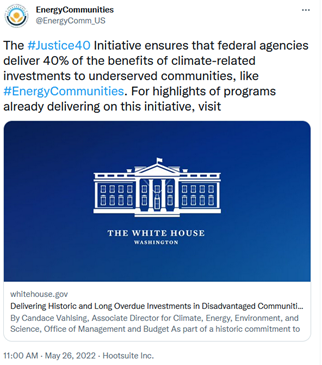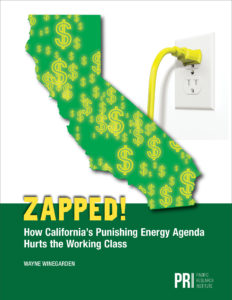|
||
Inspired by California’s “green energy” agenda, the Biden Administration is pushing a #Justice40 agenda, which aims to improve minority communities, but will actually impose huge new mandates, costs, and taxes on the very communities they aim to help. |
||
 |
||
 |
||
California Has “Been There, Done That” |
||
|
||
How California’s Costly Energy Mandates Could
|
||
| “Lower and middle-income Californians . . . bear a disproportionate share of the burden from higher gas prices . . .
“These higher prices aren’t due to oil company greed or ‘windfall profits,’ but rather are the result of costly, California-exclusive energy mandates imposed over the years by state policymakers. These mandates include cap-and-trade regulations, motor vehicle fuel standards that require emissions to be cut by 34 percent in California by 2025, low-carbon fuel standards, and expensive electric vehicle subsidies.” — “To Give Californians Real Relief from High Gas Prices, Sacramento Must Legislate Energy Prosperity,” Tim Anaya and Wayne Winegarden, Right by the Bay, 4/7/22 |
“Not surprisingly, Gov. Newsom signed controversial legislation (Assembly Bill 1346) to ban the sale of gas-powered lawn equipment. The new law will be another costly burden on the estimated nearly 8,300 landscaping businesses in the state, many of whom are minority entrepreneurs.”
— “Gas-Powered Lawn Equipment Ban Another Major Burden on Minority Entrepreneurs,” Tim Anaya, Right by the Bay, 10/18/21 |
|
| “Not only are policymakers imposing higher energy burdens on poor and minority communities, they are also using public dollars for giveaways to the rich – all in the name of energy-efficient cars.
“For years, Sacramento has played car salesman through expensive, taxpayer and ratepayer-funded subsidies for higher-priced electric cars . . . Only the wealthiest Californians are really benefiting from these programs. 79 percent of these electric subsidies are claimed by households making more than $100,000 per year.”
|
|
|
Bring Energy Savings to Minority Communities
|
||
| The Biden Administration is right to focus on improving minority communities but imposing new government energy mandates and spending more on taxpayer-funded subsidies that benefit the wealthy won’t bring relief to families that are struggling to make ends meet.
Alternatively, they should look to adopt market-based energy policies in lieu of the status quo government energy policy mix that has contributed to record-higher prices for gas and electricity in California. PRI’s research has shown the potential energy savings if California repealed or reformed these costly laws:
|
||
Visit www.kbcsandbox12.com/beentheredonethat |
||
 |
||


 Been There, Done That on Imposing New Energy Burdens on Minority Communities
Been There, Done That on Imposing New Energy Burdens on Minority Communities
